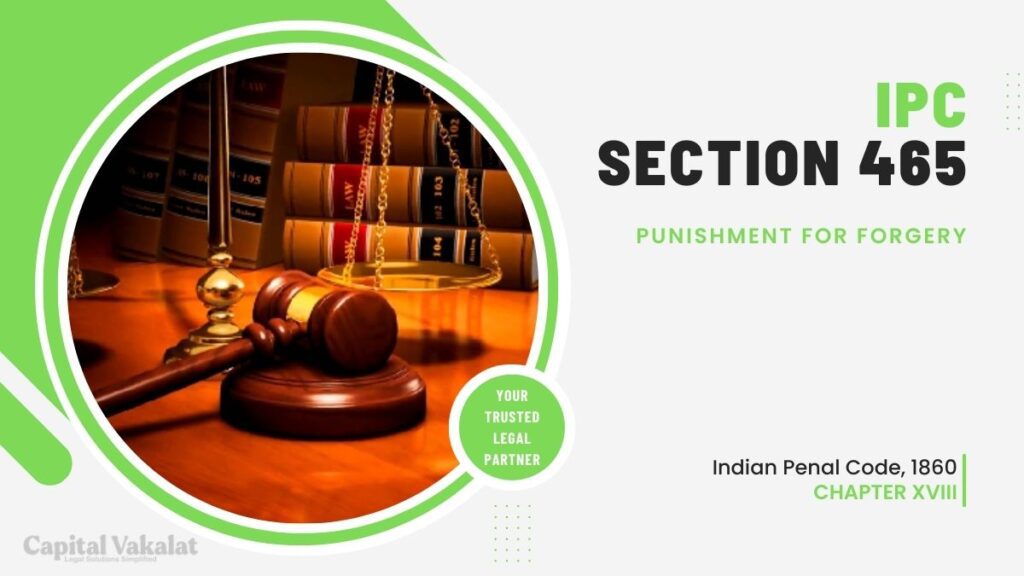Forgery, a deceptive art aimed at creating false documents, has been a challenge for legal systems worldwide. In the context of Indian law, Section 465 IPC plays a pivotal role in defining and penalizing forgery offenses.

Understanding the intricacies of this section is crucial for both legal professionals and the general public.
Introduction to Section 465 IPC
Forgery, as defined by Section 465 of the Indian Penal Code (IPC), encompasses a range of activities related to creating counterfeit documents. This section outlines the legal consequences for those involved in forgery, emphasizing the severity of such actions. For individuals unfamiliar with legal jargon, deciphering the significance of Section 465 can be perplexing. However, a grasp of its implications is essential in comprehending the consequences of forging documents.
Key Elements of Forgery
Forgery involves the creation of false documents with the intent to deceive. These documents can include anything from signatures and seals to valuable instruments. Section 465 IPC explicitly identifies the types of documents covered under its purview. Understanding the nuances of these key elements is vital in recognizing the scope of forgery laws.
Forgery Offenses and Penalties
The offenses related to forgery are diverse and can lead to severe penalties. From fake currency notes to forged property documents, the spectrum of forgery crimes is broad. Section 465 IPC prescribes penalties proportionate to the gravity of the offense, ranging from fines to imprisonment. This section serves as a deterrent against fraudulent activities that undermine the integrity of legal and financial systems.
Common Instances of Forgery
Instances of forgery are not confined to high-profile cases but permeate various aspects of daily life. From forged educational certificates to fake identification documents, individuals often find themselves victims of deception. Real-world cases serve as cautionary tales, emphasizing the need for stringent measures against forgery.
Section 465 IPC: Detailed Analysis
A closer look at Section 465 reveals a comprehensive framework for dealing with forgery. The section is divided into clauses, each addressing specific aspects of fraudulent activities. Understanding these clauses is essential for legal practitioners, investigators, and individuals seeking justice.
Legal Consequences of Forgery Convictions
Forgery convictions carry profound legal consequences. Individuals found guilty face not only imprisonment and fines but also long-term damage to their reputation. The importance of legal representation cannot be overstated, as it plays a crucial role in navigating the complexities of forgery cases.
Preventive Measures against Forgery
Preventing forgery involves a combination of awareness and proactive measures. Safeguarding personal and official documents, employing secure technologies, and staying vigilant against potential threats are key aspects of preventing forgery. In an era dominated by digital transactions, technological solutions play a crucial role in ensuring document authenticity.
Challenges in Prosecuting Forgery Cases
Prosecuting forgery cases presents challenges related to evidence collection, witness reliability, and the evolving nature of deceptive practices. Overcoming these challenges requires a collaborative effort from law enforcement agencies, legal professionals, and technology experts. Addressing these hurdles is imperative for ensuring justice in forgery cases.
Impact on Various Sectors
Forgery has far-reaching consequences, affecting individuals, businesses, and government institutions. The erosion of trust caused by forged documents can lead to financial losses and legal disputes. Organizations across sectors implement measures to safeguard against forgery, emphasizing the importance of maintaining document integrity.
Conclusion
In conclusion, Section 465 IPC serves as a robust legal tool in combating forgery. The multifaceted nature of forgery offenses demands a comprehensive understanding of this section to effectively address and prevent deceptive practices. Upholding the principles outlined in Section 465 is crucial for maintaining the integrity of legal and financial systems.
Frequently Asked Questions
What are the legal consequences of forgery convictions?
Forgery convictions can result in imprisonment, fines, and lasting damage to one’s reputation.
How can individuals safeguard against forgery?
Safeguarding against forgery involves measures such as securing personal documents, using technology, and staying vigilant.
What challenges are faced in prosecuting forgery cases?
Challenges in prosecuting forgery cases include evidence collection, witness reliability, and adapting to evolving deceptive practices.
How does forgery impact various sectors?
Forgery has widespread consequences, affecting individuals, businesses, and government institutions by eroding trust and leading to financial losses.